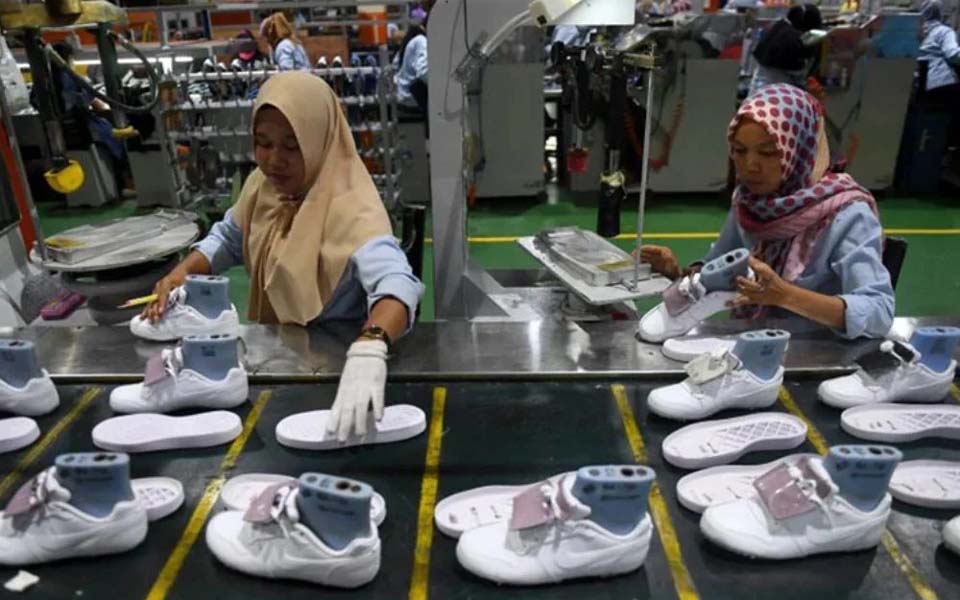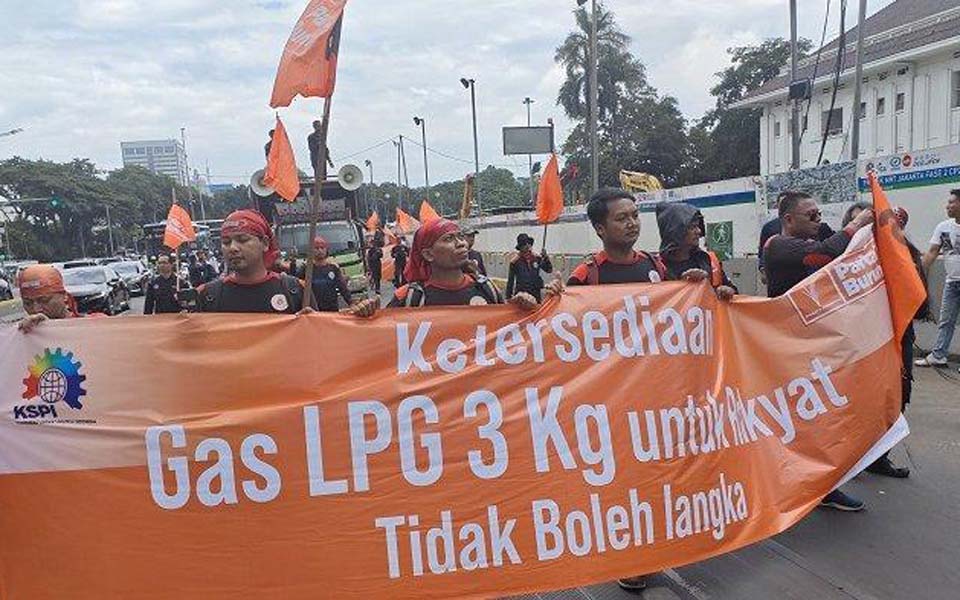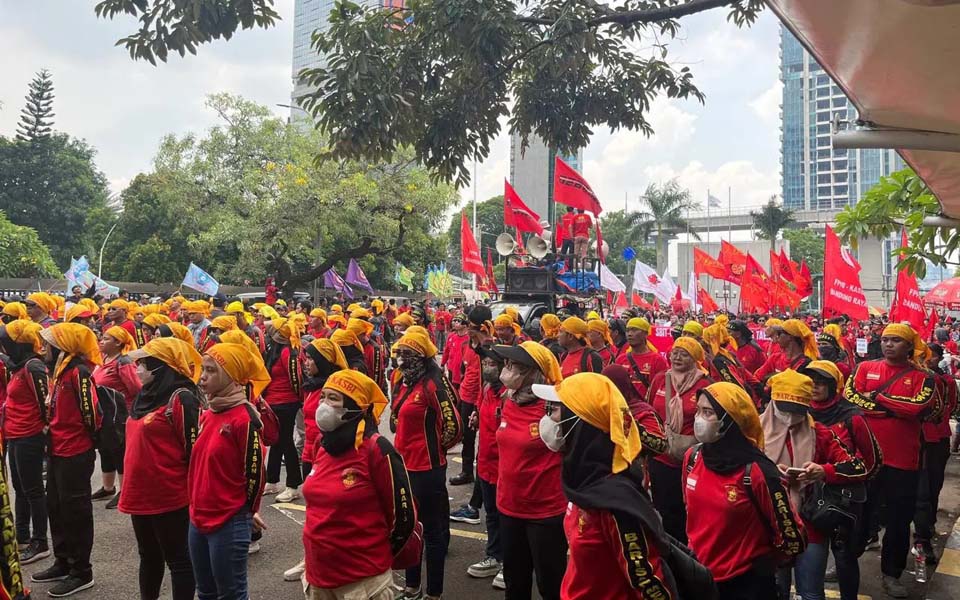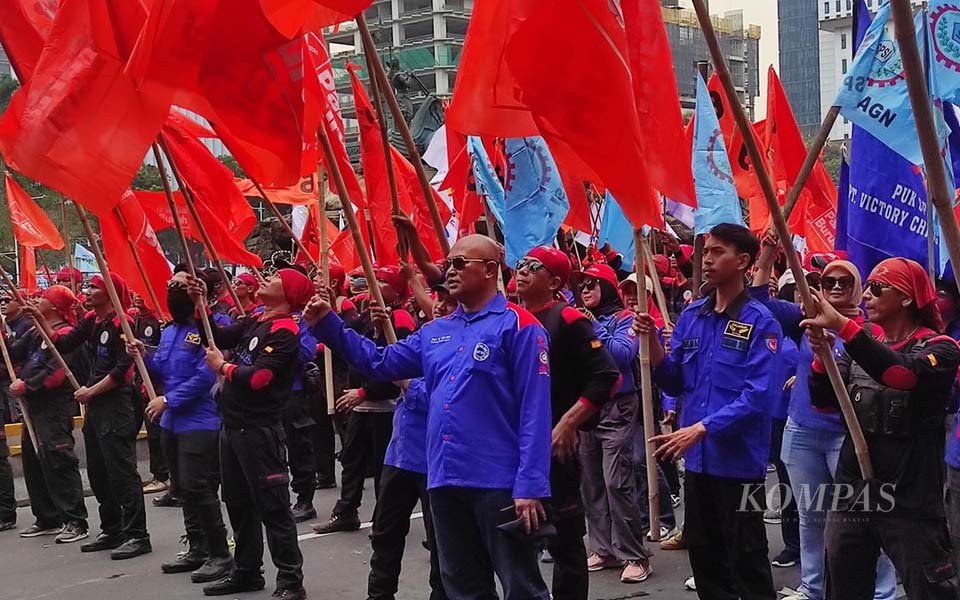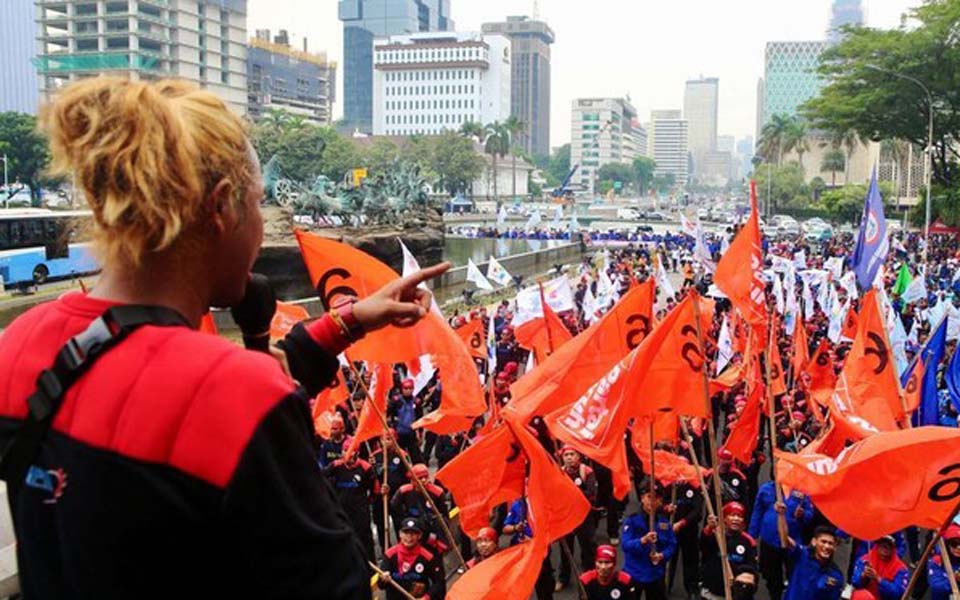Mediana – A total of 238 people out of 257 workers in six industrial sectors claimed that their monthly wage is not enough to meet the necessities of life. As many as 200 people or 78 percent of these are trapped in debt in order to survive each month.
This, among other things, came out of a survey by the Reasonable Standard of Living Committee (Komite Hidup Layak, KHL) of workers in six industries between August and September 2024. The industries referred to covered manufacturing, online transportation, airports, plantations, mining and fisheries.
Most of the respondents were in the age range of 26-30 years (63 people) and 31-35 years (51 people) with an overall average age of 32 years. More than half of the respondents were married and more than half of respondents had a high school or equivalent education.
The survey covered the cities and regencies of Tangerang, Serang city (Banten), Sukabumi city and regency (West Java), Sambas regency (West Kalimantan), Morowali regency (Central Sulawesi), Denpasar city (Bali), Brebes and Jepara regencies (Central Java) and Sidoarjo regency (East Java).
The KHL is made up of nine non-government organisations (NGOs) working on people issues and trade unions. From the trade unions, for example, there is the National Workers Union (SPN), the Transnational Palm Oil Workers Solidarity Network, the Indonesian Airport Trade Union Federation (FSPBI) and the Two-Wheeled Transport Drivers Union (Serdadu). From NGOs, for example, is Destructive Fishing Watch Indonesia and Rasamala Green Indonesia.
Based on the results of the survey, the most common reason for debt is to finance the needs of daily life. Second, to pay for work tools and third, paying for children's education. Next came social costs such as weddings and circumcisions, rent, access to health services, transfers to parents and households, and to pay off existing debt.
As many as 200 of the respondents who had debts stated that the average amount of these debts were 19,500,000 rupiah with instalments of 1,658,334 rupiah per month. When compared with a median average wage per month of 3,400,000 rupiah, monthly debt payments use up more than half of their income.
If a worker's monthly consumption reaches 5,420,000 rupiah, then they suffer an average shortfall of 1,920,000 rupiah or 34.4 percent per month. This deficit is even greater if debt instalments are workers' main priority.
The top three sources of loans are commercial banks, online borrowing and borrowing money from other people or from family members or close relatives. The intensity that they borrow money is over a relatively short span of time, namely weekly, three weekly, monthly and per semester.
The chosen method of paying off these debts is by increasing working hours, reducing consumption and borrowing again. There is also the option of paying off debts by selling off assets.
Returning home
During a discussion outlining the results of the KHL survey titled "Low Wages, High Living Costs: The Modern Debt Trap of Working Families in Six Industrial Sectors" on Wednesday October 23, SPN Research and Development (Litbang) Department head Sugianto related how many workers in the textile and footwear manufacturing industries originate from other regions.
This can be seen in factories located in Brebes and Sukabumi regencies. Because monthly wages are not enough to meet the daily needs of life, on weekends or at the end of each month workers choose to return to their place of origin then bring back rice.
"Also going home to borrow from family and relatives. To this day, this kind of phenomena continues to be repeated", he said.
According to Sugianto, a common phenomenon that has now emerged in manufacturing factories is that workers owe money to cooperatives that collaborate with online loan companies. Then, workers pay of their debts every month from their wages.
"Many factory workers who try to meet the daily needs of life find it is not enough to relying on wages, so they borrow money. But this is not through commercial banks, but cooperatives and pinjol (online-loans)", he said.
Meanwhile, FSPBI Secretary General Angga Saputra said that the national aviation industry has tended to be liberalised over the last 30 years. The implication of this is that the work system at airports tends to use outsourcing models.
"The assumption that working in the aviation industry must be bona fide and a luxury is incorrect. If workers are cabin crew and pilots, maybe yes. The situation for workers at airports is very much the opposite", he said.
Monthly wages, according to Saputra, are not enough to pay for daily household needs. And there are workers who have to give up almost half of their monthly wage to pay debts.
In order for augment their income, Saputra continued, some airport workers in East Java have side jobs after returning home from the airport such as working as ride hailing drivers; There are also some who work longer hours in order to get extra wages.
"So, after getting in debt, they continue to increase their working hours. If they don’t do this, how can they maintain their purchasing power each month. They can also save money, but the way to do this is to skip on eating", he said.
Serdadu Secretary Baron Bestari said that the debts incurred by online motorcycle taxi drivers are because there is no guarantee of a fixed monthly income. Borrowing money from online loan companies is usually done because there is no need for collateral. Plus, there are several application based companies that actually provide online loan facilities to partner drivers.
"The thing that is much crueller, is that the application based companies apply debt payment policies by making income deductions every day. Yet, the daily income of the partner drivers is unpredictable. Like it or not, we have to work every day with a duration of working hours that might be longer", said Bestari.
Rasamala Green Indonesian researcher Tri Mulyono, who also joined the survey, said that in terms of debt the situation facing mining sector workers is almost the same as workers in other sectors. The results of a survey and interview with approximately 27 mining workers in Morowali regency found that 15 had debts with commercial banks.
Meanwhile seven owed money to relatives and six owed money to online loan companies. Within the working environment there are also "jockeys" (people that provide services or circumvent normal channels) that offer loans.
"There (in Morowali regency), the price of daily necessities is expensive. There are many wage deductions. For mining workers who come from outside the region, these kinds of conditions are not easy cope with", said Mulyono.
Structural problems
Speaking in Jakarta on Friday October 25, Sedane Labour Resource Centre (LIPS) Executive Director Syarif Arifin argued that the debt trap phenomena suffered by workers is a structural problem that has the potential to create a cycle of poverty. Debt traps ultimately force workers and households to survive because wealth in the form of assets has to be sold to cover debts.
"As a result of low wages, workers can be trapped in debt and more vulnerable to entering the informal sector. Consequently, their bargaining power becomes weak. Such a phenomenon indicates that trade unions have not been able to fight for the welfare of their members", said Arifin.
Separately, Centre for Economic and Legal Studies (Celios) Executive Director Bhima Yudhistira said that in terms of formal workers, annual wage increases have been getting smaller. Workers' real wages tend to be negative, meaning they have been declining in real terms.
"From my observations, one of the causes of this is minimum wage increases that are insignificant. In terms of the government, it is not active enough in controlling the prices of basic goods. This problem is not only a matter of food price inflation, but also housing and transportation to work", he said.
This condition, Yudhistira continued, increasingly encourages the growth of precarious groups that are filled by vulnerable workers. The duration of working hours is increasingly flexible, but actually does not generate decent wages.
The phenomena of precarious workers is expected to widen to various industrial sectors because of increasingly liberal employment rules. Companies that previously had permanent employees with full working hours have shifted to short-term contract workers.
In order to address this the government needs to increase the number of formal jobs. Then, the government must actively control prices, especially the price of transportation services and housing. Furthermore, the government needs to balance the supply and demand of job vacancies.
"Even if they are forced into debt, consumptive loan interest rates should not be too expensive", Yudhistira added.
[Translated by James Balowski. The original title of the article was "Buruh Industri Hidup dari Utang ke Utang".]







